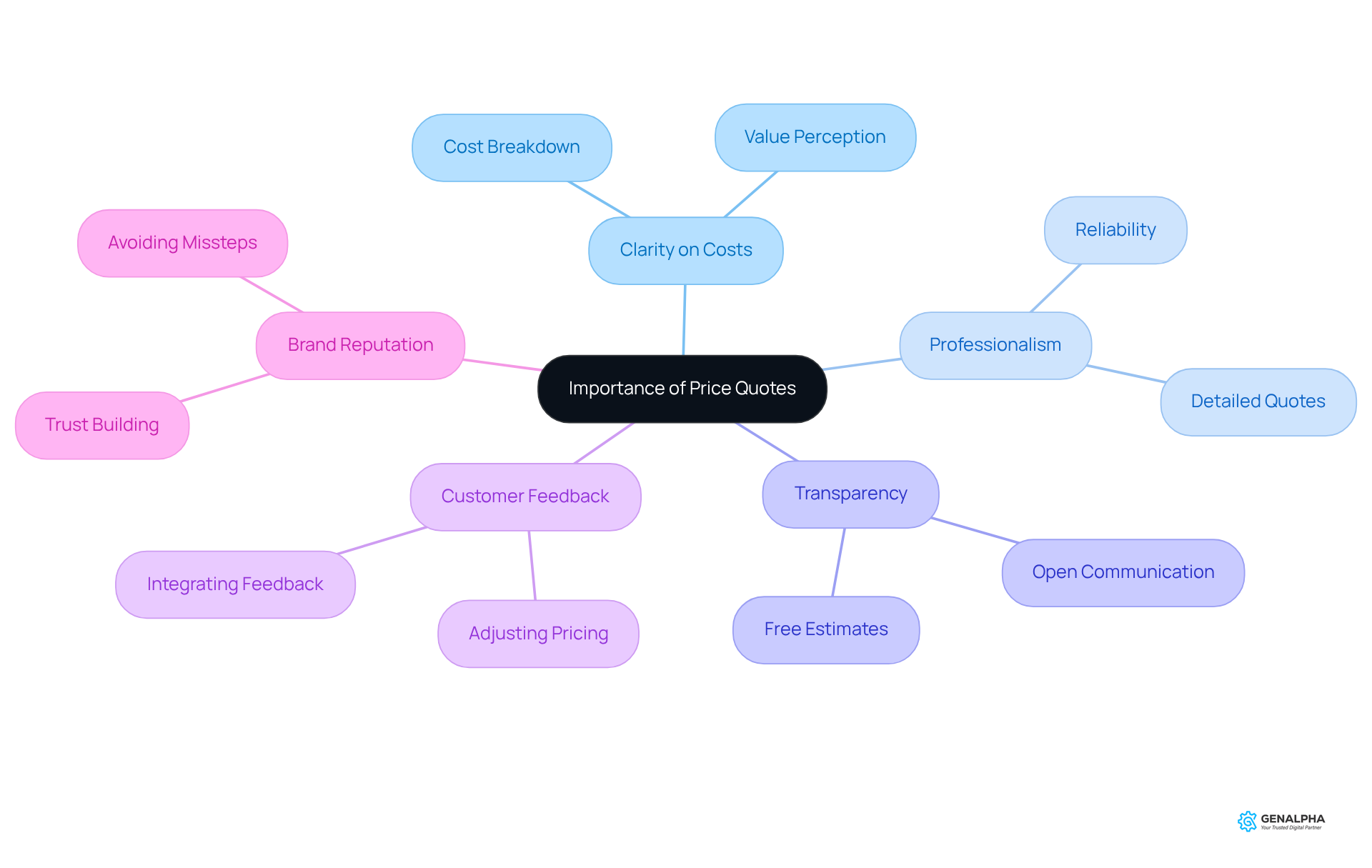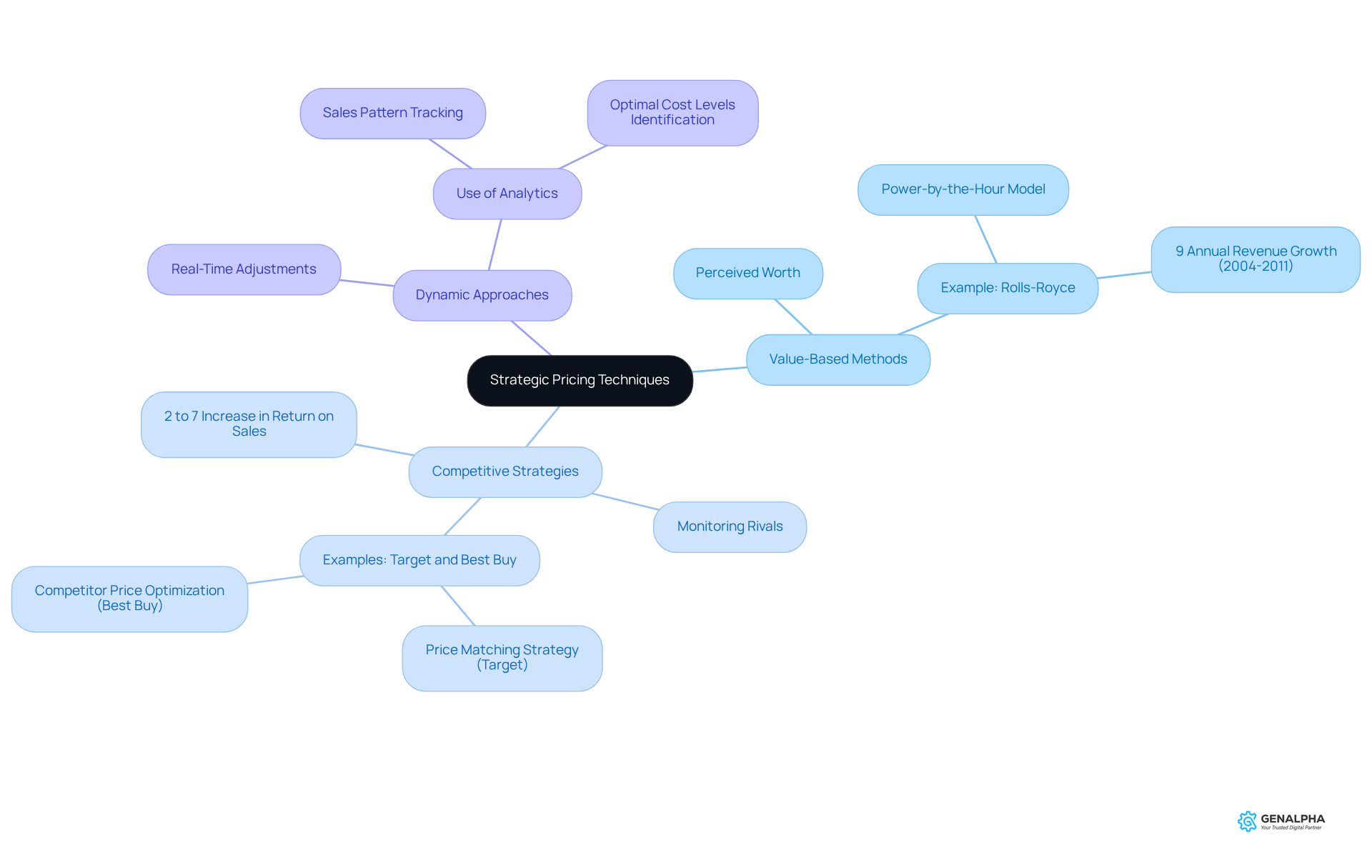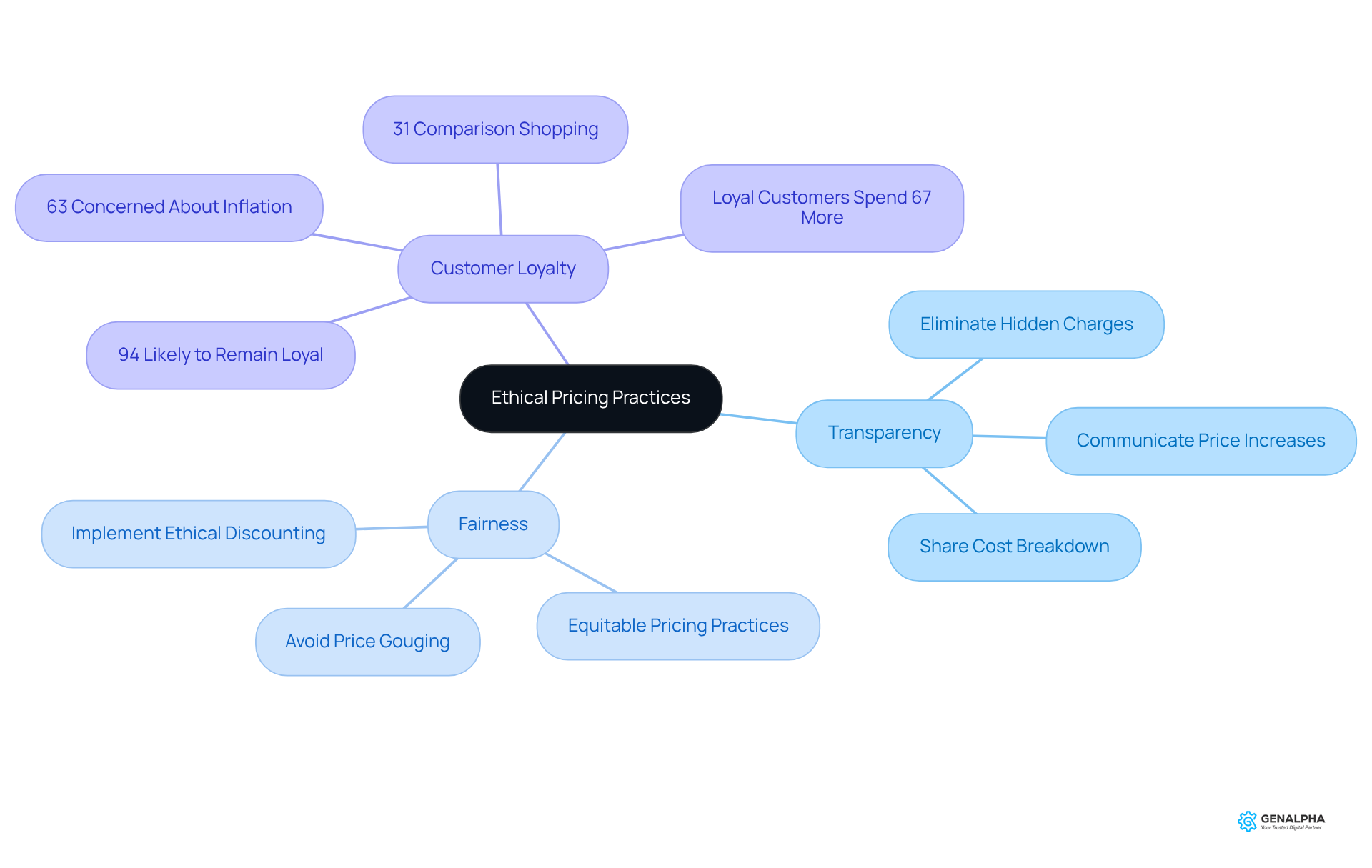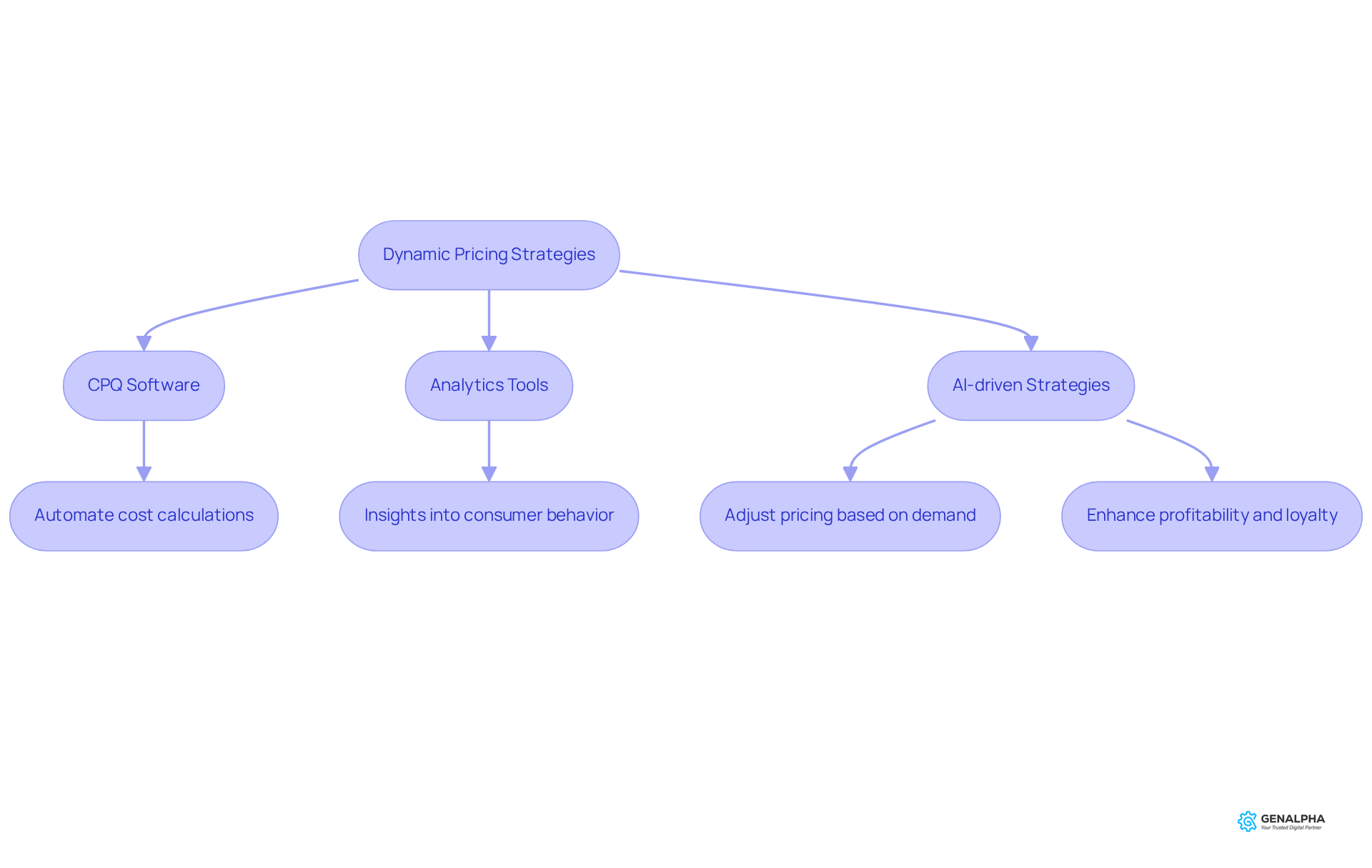Overview
The article identifies critical challenges in quotation pricing within the manufacturing sector, highlighting the necessity of transparency and ethical practices. It presents four strategic approaches that not only address these challenges but also leverage digital tools to build customer trust and enhance sales efficiency.
- By establishing clear cost structures and adhering to ethical pricing, manufacturers can cultivate long-term relationships with clients.
- Furthermore, the implementation of dynamic pricing tools empowers manufacturers to swiftly adapt to market fluctuations, thereby optimizing their pricing strategies for greater profitability.
- This comprehensive approach not only reinforces credibility but also invites manufacturers to rethink their pricing methodologies for sustained success.
Introduction
Quotation pricing is a crucial component in the manufacturing sector, serving as a vital link between businesses and their clients by fostering trust and transparency. In an industry rife with challenges, manufacturers must navigate the complexities of pricing models and adapt to ever-changing market dynamics. By implementing effective strategies, manufacturers can enhance their sales efficiency and strengthen customer relationships through ethical pricing practices.
However, the real question arises: how can manufacturers effectively balance competitive pricing with the need for transparency and ethical considerations to cultivate lasting customer loyalty? This balance is not just a goal; it is essential for sustainable growth and success in the competitive landscape.
Understand the Importance of Price Quotes in Building Customer Trust
Quotation pricing is a critical touchpoint in the buyer journey, offering essential clarity on costs and terms. A meticulously articulated quotation pricing not only delineates the cost structure but also exemplifies a company's professionalism and reliability.
For instance, detailed breakdowns of costs empower clients to grasp the value they are receiving, thereby cultivating trust. Businesses that prioritize transparency in their pricing are more likely to forge enduring connections with clients, as buyers feel more confident in their purchasing decisions.
Furthermore, offering assures prospective clients of a business's commitment to openness regarding quotation pricing, which is fundamental for establishing trust. Integrating client feedback into the quoting process can further bolster trust, demonstrating that the company values its patrons' opinions and is dedicated to meeting their needs. This feedback also aids in determining appropriate cost levels, enhancing customer-focused communication.
Conversely, businesses that fail to communicate cost changes effectively, as evidenced by Wendy's surge pricing misstep, jeopardize their brand reputation and risk eroding consumer trust. By emphasizing clear costs, companies can strengthen their market position and deepen client relationships.

Implement Strategic Pricing Techniques to Boost Sales Efficiency
To enhance sales efficiency, manufacturers must adopt strategic techniques such as value-based methods, competitive strategies, and dynamic approaches. Value-oriented cost determination emphasizes establishing rates based on the to the client rather than merely on production expenses. This method can lead to significant sales increases, as customers are often willing to pay a premium for products they perceive as high-value. For instance, companies like Rolls-Royce have effectively implemented value-based financial models, resulting in a 9% annual increase in services revenue from 2004 to 2011.
Competitive rates require a thorough examination of rivals' cost strategies to ensure that quotation pricing remains appealing while still being profitable. Retailers such as Target and Best Buy exemplify this approach by consistently monitoring competitor costs to refine their own. Statistics indicate that effective competitive cost strategies can yield a 2% to 7% increase in return on sales, underscoring the necessity of staying informed about market dynamics.
Dynamic cost management empowers producers to implement quotation pricing, allowing them to adjust rates in real-time based on market demand, inventory levels, and consumer behavior. By leveraging analytics tools to track sales patterns, producers can identify optimal cost levels that enhance revenue while ensuring client satisfaction. This adaptability is crucial in a rapidly evolving market, enabling manufacturers to respond swiftly to demand fluctuations and maintain a competitive edge.

Adopt Ethical Pricing Practices to Foster Long-Term Customer Relationships
Implementing ethical cost strategies is essential for cultivating lasting customer relationships. This requires clarity in cost structures, the elimination of hidden charges, and a commitment to ensuring that accurately reflects the true value of products or services. Manufacturers must also consider the ethical implications of their cost strategies, avoiding practices such as price gouging during periods of high demand, as these actions can provoke significant backlash and tarnish a company's reputation.
By prioritizing fairness and transparency, businesses can build trust with their clients through quotation pricing, which is crucial for fostering loyalty and encouraging repeat business. For example, manufacturers like Patagonia and IKEA have successfully embraced transparent cost strategies, openly sharing their rationale and engaging clients in discussions about cost adjustments. This approach has proven effective in nurturing a loyal customer base.
Furthermore, ethical cost strategies not only enhance a company's reputation but also position it as a preferred choice among consumers who value integrity in terms of quotation pricing. Statistics reveal that:
- 94% of consumers are likely to remain loyal to brands that demonstrate complete transparency.
- 63% express concerns about inflation.
- 31% frequently compare prices.
These figures underscore the significant impact of ethical cost practices on customer retention and advocacy.

Leverage Digital Tools for Dynamic Pricing Strategies
Utilizing digital tools is essential for executing that adapt to real-time market conditions. Tools such as Configure Price Quote (CPQ) software automate cost calculations, ensuring accuracy and speed in generating quotation pricing. These tools examine various elements, including competitor costs, consumer demand, and inventory levels, to recommend optimal strategies for setting prices.
For instance, a producer utilizing CPQ software can swiftly modify quotation pricing based on variations in raw material expenses or shifts in buyer demand, allowing for more flexible cost strategies. Furthermore, incorporating analytics tools provides insights into consumer behavior, enabling producers to customize their strategies to satisfy specific client needs and preferences.
Notably, producers employing AI-driven cost strategies experience enhanced profitability and customer loyalty, underscoring the effectiveness of these digital solutions. Companies such as Amazon exemplify successful dynamic cost strategies in a competitive environment by adjusting rates based on market conditions to enhance sales performance.
As Eric Carrasquilla, CEO of Vendavo, emphasizes, price optimization is a crucial strategic resource for B2B producers. By adopting these digital solutions, manufacturers can significantly enhance pricing efficiency and boost overall sales performance.

Conclusion
Quotation pricing stands as a crucial pillar in the manufacturing sector, fundamentally shaping customer trust and influencing purchasing decisions. By effectively communicating costs and terms, manufacturers not only showcase their professionalism but also cultivate enduring relationships with clients. This approach highlights the importance of transparency and ethical practices, essential components in establishing a reliable brand image.
The article delineates four critical strategies for enhancing quotation pricing:
- Recognizing the significance of price quotes
- Implementing strategic pricing techniques
- Adopting ethical pricing practices
- Leveraging digital tools for dynamic pricing
Each strategy plays a vital role in improving sales efficiency while nurturing customer loyalty. From value-based pricing to the utilization of advanced digital tools, manufacturers can adapt to market demands, ensuring clarity and fairness in their cost structures.
Ultimately, integrating these pricing strategies can lead to a more sustainable business model that prioritizes customer satisfaction and trust. By embracing transparency, ethical practices, and innovative technologies, manufacturers can position themselves as trusted partners in the eyes of their clients. As the market continues to evolve, it is imperative for businesses to remain agile, leveraging these insights to enhance their quotation pricing approach and secure long-term success.
Frequently Asked Questions
Why are price quotes important in the buyer journey?
Price quotes are critical in the buyer journey as they provide essential clarity on costs and terms, helping to establish a company's professionalism and reliability.
How do detailed cost breakdowns affect customer trust?
Detailed breakdowns of costs empower clients to understand the value they are receiving, which cultivates trust and confidence in their purchasing decisions.
What role does transparency in pricing play in customer relationships?
Businesses that prioritize transparency in their pricing are more likely to build enduring connections with clients, as buyers feel more assured about their decisions.
How can offering free estimates contribute to customer trust?
Offering free estimates upfront demonstrates a business's commitment to openness regarding pricing, which is fundamental for establishing trust with prospective clients.
In what way does client feedback enhance the quoting process?
Integrating client feedback into the quoting process shows that a company values its patrons' opinions and is dedicated to meeting their needs, which further bolsters trust.
What can happen if businesses fail to communicate cost changes effectively?
Failing to communicate cost changes can jeopardize a brand's reputation and risk eroding consumer trust, as seen in Wendy's surge pricing misstep.
How can companies strengthen their market position through pricing communication?
By emphasizing clear costs and communicating effectively, companies can strengthen their market position and deepen their relationships with clients.




